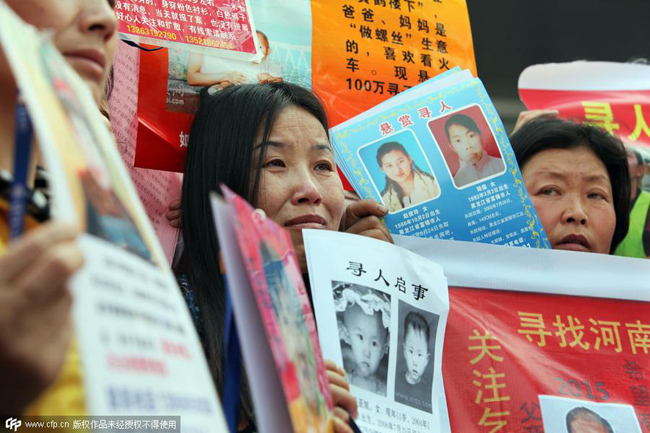Little mercy for child abductors and buyers
By Zhang Zhouxiang (China Daily) Updated: 2015-06-27 10:59
 |
|
Parents at a gathering looking for their missing children in Zhengzhou, capital of Central China's Henan province on April 26, 2015. [Photo/CFP] |
Although authorities have labeled it speculation, the rumor over the amendment to the Criminal Law to ensure that everyone guilty of abducting children faces punishment up to the death penalty is still being widely reposted on social networks.
The call for the death penalty for a crime has seldom been so widely supported as that against kidnappers. Perhaps this is because of the family planning policy which allows most couples to have only one child despite the changes initiated last year. For families that can legally have only one child, losing their offspring could be disastrous. In some cases, mothers have lost their mental balance and couples have separated.
But in contrast to the severity of the problem, the percentage of child kidnapping cases solved has remained low. According to the National Working Committee on Children and Women, of the more than 18,000 abduction cases involving children and women, only 4,000, or 22 percent, were solved. Worse, even if a case is solved and the suspect arrested, in most cases abducted children are not reunited with their families because they are sold to people hundreds, even thousands, of kilometers away, mostly in villages, through criminal networks. The arrest of one kidnapper doesn't necessarily lead to the busting of an entire gang.
Lost and Love, a 2015 Hong Kong film starring Andy Lau, shows how a father travels from one place to another for more than 16 years distributing posters to find his lost son. It is the desperation of tens of thousands of such parents across China that has led to the call of imposing the heaviest punishment on abductors.
The police have a lot to complain about, too. Finding a lost child is a time-and energy-consuming job because police officers often have to travel thousands of kilometers only to find that the child they are looking for has already been resold to another family, say, another 1,000 km away.
Li Zhaohai, a policeman in Harbin, Northeast China's Heilongjiang province, said that one single journey could cost about 50,000 yuan ($8,055), or one-tenth of a police station's annual running cost. And since there is no special fund for such special search operations, police officers are reluctant to launch them.
The severest punishment for abducting children is death, but many parents want all kidnappers to get the capital punishment. This can be attributed to people's fear that judicial corruption or other reasons could result in kidnappers being let off with a lighter sentence.
According to the Supreme People's Court, courts across China heard 7,719 kidnapping cases from 2010 to 2014 and convicted 12,963 people, sentencing some who had committed "extremely wicked deeds" - raping or killing the abducted children - to death. Zhang Shuxia, an obstetrician in Fuping, North China's Shaanxi province, stole and sold six newborns, telling their parents that their children were either stillborn or died after birth. Yet she was given a two-year reprieve from the death penalty, which normally would turn into 20 years' imprisonment after two years. Her case sparked heated public debates with many people fearing it could encourage other criminals.
Another serious flaw with the current judicial practice is that people who buy abducted children are seldom punished even though doing so is a crime. A clause in the Criminal Law says buyers could be exempted from criminal punishment if they don't prevent kidnapped children from being rescued. The clause has been grossly abused because those buying kidnapped children are seldom punished for their illegal acts. So many legal experts have called for amending the clause to curb the demand for kidnapped children.
The National People's Congress Standing Committee has just agreed to review recommendations to amend the Criminal Law to ensure that people who buy kidnapped children get appropriate punishment. This is a welcome move because it could curb the demand for abducted kids.
The author is a writer with China Daily. zhangzhouxiang@chinadaily.com.cn

I’ve lived in China for quite a considerable time including my graduate school years, travelled and worked in a few cities and still choose my destination taking into consideration the density of smog or PM2.5 particulate matter in the region.











